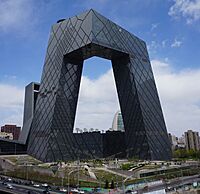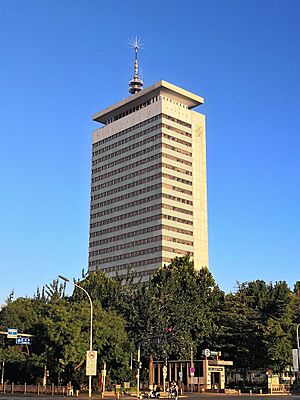China Central Television facts for kids
 |
|

The China Central Television Headquarters in 2019
|
|
| Type | State media |
|---|---|
| Country | China |
| First air date | 1 May 1958 |
| Founded | Beijing |
| Headquarters | CCTV Headquarters, Beijing, People's Republic of China |
| Broadcast area | Worldwide |
| Owner | |
| Parent | China Media Group |
| Former names | Beijing Television |
| Free channels | 25 |
| Pay channels | 19 |
| Callsigns | Voice of China (external) |
| Affiliation | China Global Television Network |
| China Central Television | |||||||||||||||
|---|---|---|---|---|---|---|---|---|---|---|---|---|---|---|---|
| Simplified Chinese | 中国中央电视台 | ||||||||||||||
| Traditional Chinese | 中國中央電視台 | ||||||||||||||
| Literal meaning | China Central Television Station | ||||||||||||||
|
|||||||||||||||
| Chinese abbreviation | |||||||||||||||
| Simplified Chinese | 中央电视台 | ||||||||||||||
| Traditional Chinese | 中央電視台 | ||||||||||||||
| Literal meaning | Central Television Station | ||||||||||||||
|
|||||||||||||||
| Second alternative Chinese name | |||||||||||||||
| Simplified Chinese | 央视 | ||||||||||||||
| Traditional Chinese | 央視 | ||||||||||||||
| Literal meaning | Central-Vision | ||||||||||||||
|
|||||||||||||||
China Central Television (CCTV) is the national television broadcaster of China, established in 1958. CCTV is operated by the National Radio and Television Administration which reports directly to the Chinese Communist Party (CCP)'s Central Publicity Department.
CCTV has a variety of functions, such as news communication, social education, culture, and entertainment information services. It is a key player in the Chinese government's propaganda network. According to Freedom House and other media commentators, CCTV's reporting about topics sensitive to the Chinese government and CCP is distorted and often used as a weapon against the party's perceived enemies.
Contents
History
In 1954, CCP chairman Mao Zedong put forward that China should establish its own TV station. On 5 February 1955, the central broadcasting bureau reported to the State Council and proposed the program of establishing a medium-sized television station, later on premier Zhou Enlai included in China's first five-year plan the planned introduction of television broadcasts. In December 1957, the central broadcasting bureau sent Luo Donghe and Meng Qiyu to the Soviet Union and the German Democratic Republic for the inspection of their TV stations (see Television in the Soviet Union and Deutscher Fernsehfunk), then the duo returned to Beijing to prepare for the establishment of the TV station.
In time for its 20th jubilee, Beijing Television was formally renamed China Central Television on 1 May 1978, and a new logo was unveiled.
Until the late 1970s, CCTV held only evening broadcasts, usually closing down at midnight. During the summer and winter academic vacations, it occasionally transmitted daytime programming for students, while special daytime programs were aired during national holidays.
In 1980, CCTV experimented with news relays from local and central television studios via microwave. It also had its first international collaboration that year, production of the documentary series Silk Road with Japan's public broadcasting company, NHK. In 1984, CCTV established the wholly-owned subsidiary China International Television Corporation (CITVC).
By 1985, CCTV had already become a leading television network in China. In 1987, CCTV's grew due to the adaptation and presentation of Dream of the Red Chamber, the first Chinese television drama to enter the global market. In the same year, CCTV exported 10,216 shows to 77 foreign television stations.
Initially, the CCP's Central Publicity Department issued directive censorship of programs. During reform in the 1990s, it adopted new standards for CCTV, "affordability" and "acceptability", loosening the previous government control. Affordability refers to purchasing ability of programs, while acceptability requires that a program has acceptable content, preventing the broadcast of material that contains inappropriate content or expresses views against the CCP.
In March 2018, as the nation began marking the 60th year of television, CCTV ownership changed hands to a new state holding group, the China Media Group.
Overseas broadcasting
In 1990, CCTV subsidiary, CITVC, established China Television Corporation in California to distribute CCTV content in the U.S. In 2000, CCTV's all-English channel, known as CCTV-9 or CCTV International, was launched.
In 2001, the Great Foreign Propaganda Plan was launched by Xu Guangchun, the head of SARFT, also the deputy head of the Publicity Department of the Chinese Communist Party after the urgency of bringing the voice of China to the world was presented by Jiang Zemin, former General Secretary of the Chinese Communist Party. The idea of an English channel was brought out in 1996. CCTV-4 had three half-hour English news broadcasting every day, but later, on 25 September 2000, CCTV-9 a satellite channel was set up to be the first 24-hour English channel, aimed to establish the overseas market. In October 2001, CCTV partnered with AOL Time Warner and other foreign news corporations, giving them access to the Chinese media market in exchange for cable delivery in the US and Europe, mainly delivering CCTV-9 programs.
The CCTV-4 channel split into three separate channels on 1 April 2007—each serving different time zones: China Standard Time (CST), Greenwich Mean Time (GMT), and Eastern Standard Time (EST)—in order to improve service for audiences around the world.
On 25 July 2009, CCTV launched its Arabic-language international channel, stating that it aims to maintain stronger links with Arab nations.
In 2015 and 2018, CCTV signed cooperation agreements with Russian state media outlet RT.
In December 2016, CCTV's foreign language services were spun off into China Global Television Network (CGTN).
China Network Television
China Network Television (CNTV) was an internet-based broadcaster of China Central Television which launched on 28 December 2009.
Organization
China Central Television, as a component of the CMG, falls under the supervision of the National Radio and Television Administration which is in turn subordinate to the CCP's Central Publicity Department. The organization is considered one of the "big three" state media outlets in China, along with the People's Daily and Xinhua News Agency.
Management
The current president of CCTV is Shen Haixiong, who was appointed in February 2018.
Programs
CCTV produces its own news broadcasts three times a day and is the country's most powerful and prolific television program producer. Its thirty-minute evening news, Xinwen Lianbo ("CCTV Network News" or "CCTV Tonight", Chinese: 新闻联播), goes on air daily at 7:00 pm Beijing time. All local stations are required to carry CCTV's news broadcast. An internal CCTV survey indicates that nearly 500 million people countrywide regularly watch this program.
Focus, first introduced in 1994, is a popular CCTV show which regularly exposes the wrongdoings of local officials, which attracts serious attention from higher levels of government. It also exposes the Chinese government's response to charges of corruption.
The CCTV New Year's Gala (Chinese: 中国中央电视台春节联欢晚会)—a yearly special program for the Chinese New Year—is the most-watched CCTV show.
In 2003, CCTV launched its first 24-hour news channel, initially available to cable viewers.
Channels
As of 2007[update], China's television audience rose to 1.2 billion. As content becomes more diversified, there have been concerns about the audience share, as CCTV is losing out to cable, satellite and regional networks. In Guangzhou for example, CCTV programming only accounts for 45% of the weekly audience share, while in Shanghai, local stations also have share over CCTV. However, the CCTV New Year's Gala remains extremely popular; it acquires more than 90% audience share over the nation.
Personalities
Producing a variety of different programming, China Central Television has a number of different program hosts, news anchors, correspondents, and contributors who appear throughout daily programing on the network.
- Ai Hua
- Bai Yansong
- Bao Xiaofeng
- Daniela Anahí Bessia
- Bi Fujian
- Chai Jing
- Chai Lu
- Chen Yin
- Dashan
- Dong Hao
- Dong Qing
- Marc Edwards
- Gao Bo
- Gang Qiang
- Guo Zhijian
- Hai Xia
- He Jing
- Jing Yidan
- Ju Ping
- Vimbayi Kajese
- Kang Hui
- Michele Lean
- Li Ruiying
- Li Sisi
- Li Xiaomeng
- Li Yong
- Li Zimeng
- Liu Chunyan
- Lu Jian
- Edwin Maher
- Ouyang Xiadan
- Negmat Rahman
- Ren Luyu
- Rui Chenggang
- Sa Beining
- Wang Ning
- Wang Xiaoya
- Wang Zhi'an
- Zhang Hongmin
- Zhang Mengmeng
- Zhang Tengyue
- Zhou Tao
- Zhu Jun
- Zhu Xun
See also
 In Spanish: Televisión Central de China para niños
In Spanish: Televisión Central de China para niños
- Mass media in China
- Television in the People's Republic of China



